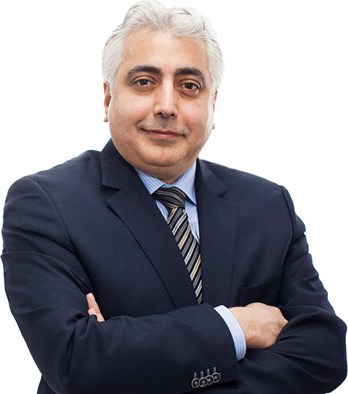We were delighted to catch up with Dr Firas Al-Niaimi about his career.

You are internationally recognised in the fields of Mohs surgery, lasers and dermatology – can you tell us a little bit about your background?
I grew up in Manchester to a Middle Eastern family with a strong medical and scientific background. My father was a professor in oncology and that is how I became familiar with medicine from an early age. I chose a career in dermatology and did my formal specialist training in Manchester which is one of the largest dermatology departments in Europe. Subsequent to that I moved to London to do a highly competitive and prestigious Mohs surgery and lasers fellowship at the world-renowned St. John’s Institute of Dermatology at St. Thomas’ hospital where I continued to work there part-time as an honorary consultant until early this year. Mohs surgery is a highly specialised technique in removing certain types of skin cancer ensuring high cure rate and tissue preservation. Currently I am in full-time private practice in London performing Mohs surgery, advanced lasers alongside medical dermatology. I recently joined a Danish university as a lecturer and researcher where I am involved in clinical and translational research particularly in the field of laser dermatology in addition to teaching and training future dermatologists.
What achievement are you most proud of?
I am proud of where I am today and what I have achieved through my hard work, but I probably would answer this through each different timeline in my career.
As a dermatology trainee I was most proud of the fact that I wrote and edited a book on dermatology speciality exam preparation questions which still forms one of the key important books for international dermatologists to read in preparation of the specialist certificate exam set out by the Royal College of Physicians. We have our fourth edition out now and at times the book has been sold out!
During the last few years as a dermatologist I am most proud of my excellent academic track record work with over 180 scientific publications (will reach 200 this year!), many book chapters and over 300 lectures in 55 countries around the world (that is just under a third of the world!). I am humbled to have been involved in training hundreds of doctors from all around the world.
Lastly, I am very proud of being awarded the title ‘Consultant Dermatologist of the Year 2019 London” a few months ago by the Global Excellence Awards Committee for my contribution to British dermatology.
What has been the best piece of advice that you have received in your career and what advice would you offer to those following in your footsteps?
One of the key early influential figures in my dermatology career was my late supervisor and mentor, Professor Neil Cox, who was a renowned dermatologist and one of the best I have ever met. He advised me that dermatology is a fascinating discipline but one that is changing constantly and so it is of great importance to keep reading, writing and reflecting on your practice. The one sentence I still clearly remember is “the harder I work the luckier I get” and this is indeed true.
My advice to fellow colleagues is to try and connect with the work or speciality they do and keep reading and learning and sharing information. Never give up and hard work does pay off!
Your field is evolving all the time; what do you think have been the most exciting developments in recent years?
The most exciting developments are the advances in technology and the application of these advances in diagnostic and therapeutic dermatology. An example is artificial intelligence in dermatology which will expand and play a bigger role in our discipline in the future. It is already implemented in skin cancer detection with a high level of accuracy. Alongside this are the advances in skin imaging and biomedical applications in dermatology such as high frequency ultrasound in diagnostics, optical coherence tomography, and multiphoton microscopy. In the coming years we will see more advances in this field which is part of my current research alongside the clinical applications of lasers in dermatology.
Lastly, we are entering the era of ‘personalised medicine’ where our genomics will dictate and influence future selected treatments with pharmacogenetics being just one example.
If you could recommend that dermatologists read one textbook or journal paper what would it be?
The unique thing about dermatology is that it has many branches, from surgical, lasers, cosmetics and immunodermatology, to name just a few, and each has their own journal(s) or textbook(s). Dermatologic Surgery, Lasers in Surgery and Medicine, and the Journal of the American Academy of Dermatology are the three journals I regularly read and would recommend. For the science-oriented person who is looking into basic science in the field of lasers and photonic medicine the Journal of Biophotonics is a good one.
Where do you hope your career will take you in the next 10 years?
Difficult question! It is always tricky to look into the future with so many variables involved around our work and speciality. I hope I will be more involved in research and become a professor in my field and hit 300 scientific publications with another book to write. It is going to be hard work but again 10 years is a reasonable timeframe!
And finally, if you have any spare time how do you like to relax?
I like being close to nature and enjoying what it offers. Recently, spending quality time with friends and family has become a passion for me. Of course, there is the passion for reading and concerts too unless my team Manchester United is playing!



